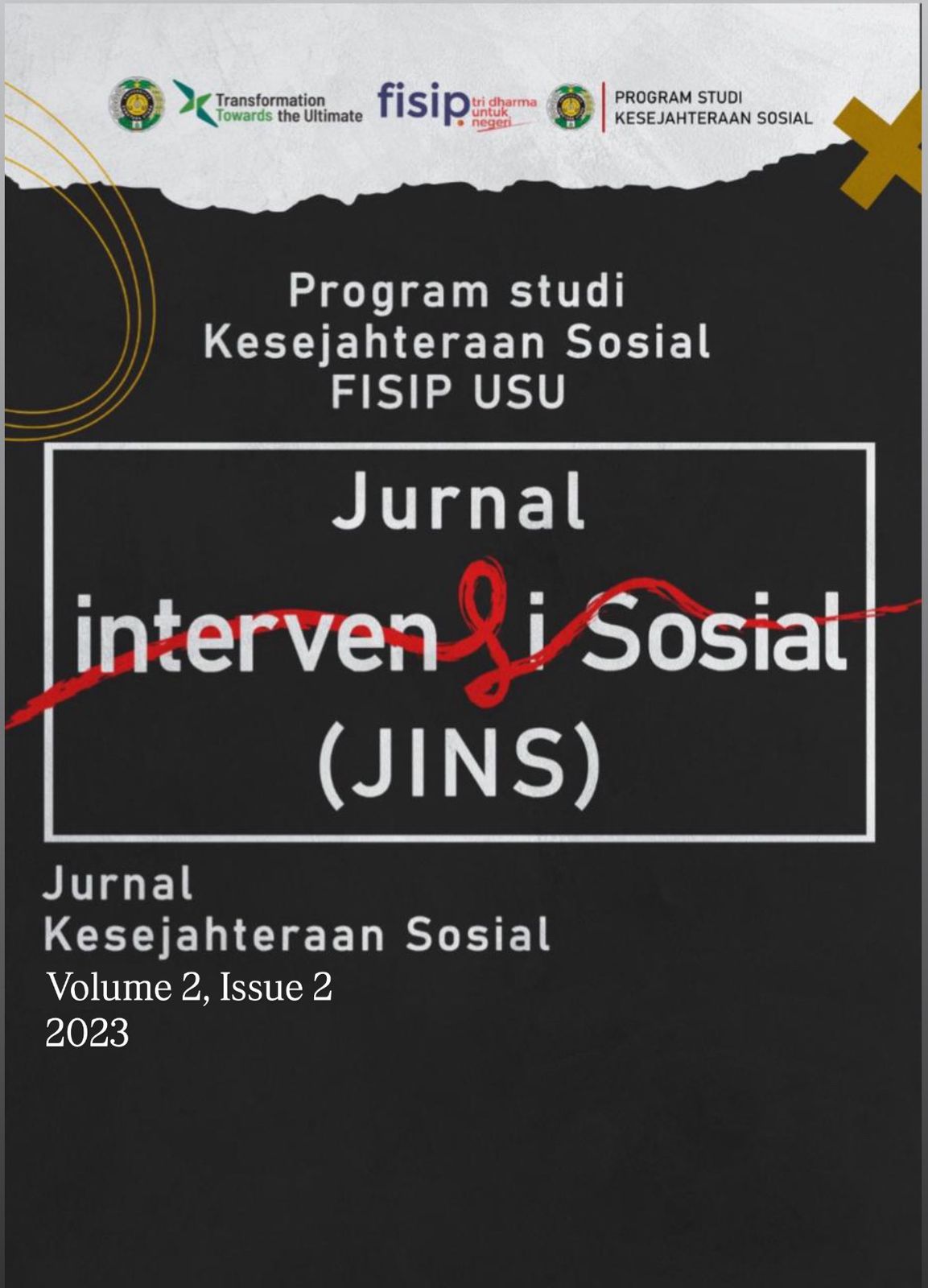Unbalanced between Work Ethic and Result of Poor Families in Alue Naga Community
DOI:
https://doi.org/10.32734/intervensisosial.v2i2.14820Keywords:
Work Ethic; Poor Families; Families EconomyAbstract
Abstract
Work Ethic is one of the important keys to get maximum results. In Aceh there is a pearl of wisdom about work ethic: Menyoe hana tausaha pane atra roet di manyang (if we do not work, there won’t be treasures falling from the sky). Poverty is not without causes; among the causes is work ethic. This paper looks at the work ethic of families in Gampong Alue Naga, especially the youth, because they are the most potential members of society. The study used qualitative design with descriptive analysis. Data was obtained through observation, interviews and documentation. The results showed that the family work ethic in Alue Naga was considered very good, however, they still lived poor lives. Based on the study, there were some factors affecting their work results, such as: narrow employment opportunities; their work as fishermen was still using traditional method, their equipment for work such as boats, trawls; fishing rods were still very limited in numbers and their work was also not supported by sufficient skills. Therefore, despite the high work ethic, the majority of people in this Gampong (village) were still poor. It proved that work ethic alone is not enough to gain a better income. It is highly suggested that the government and related parties who feel compelled to advance society in the economic field need to provide guidance, direction and assistance to residents who are still eager to work in order to increase their incomes.
Keywords: Work Ethic; Poor Families; Families Economy
Downloads
References
REFERENCES
Aprianto, N. E. K. (2017). Kemiskinan Dalam Perspektif Ekonomi Politik Islam. Islamiconomic: Jurnal Ekonomi Islam. Volome 8, No. 2, p.169-188
Aflah, K N. (2017). Urgensi Penetapan Kriteria Fakir Miskin Bagi Penyaluran Zakat di Indonesia. Zizwaf: Jurnal Zakat dan Wakaf. Volome 4, No. 1. P. 167-192
BPS Aceh (2022). Persentase Penduduk Miskin. Retrieved from https://aceh.bps.go.id/indicator/23/42/1/persentase-penduduk-miskin.html April 2022
BPS Aceh (2022). Profil Kemiskinan Penduduk di Provinsi Aceh. Retrieved from https://aceh.bps.go.id/pressrelease/2022/07/15/702/profil-kemiskinan-penduduk-di-provinsi-aceh-maret-2022.html June 2022
BPS Banda Aceh (2022). Banda Aceh Dalam Angka. Retrieved from https://bandaacehkota.bps.go.id June 2022
BPS Republik Indonesia (204). Perhitungan dan Analisis Kemiskinan Makro Tahun 2014. Retrieved from www.bps.go.id 30 June 2022
BPS Republik Indonesia, Perhitungan dan Analisis Kemiskinan Makro Indonesia 2019. Retrieved from www.bps.go.id 30 June 2022
BPS RI (2022). Persentase PendudukMiskin September 2022 Naik Menjadi 9,57 Persen. Retrieved from https://www.bps.go.id/pressrelease/2023/01/16/2015/persentase-penduduk-miskin-september-2022-naik-menjadi-9-57-persen.html 2 October 2022
BPS. (2019). www.bps.go.id, Perhitungan dan Analisis Kemiskinan Makro Tahun 2019. Retrieved from https://www.bps.go.id/publication/2019/12/20/60138aa2d7b9b78802991240/penghitungan-dan-analisis-kemiskinan-makro-di-indonesia-tahun-2019.html October 2022
Harun, M. (2009). Memahami Orang Aceh. Cet. Pertama, Medan: Media Perintis.
Hermawati, I (2015). Pengkajian Konsep dan Indikator Kemiskinan. Yogyakarta: Balai Besar Penelitian Dan Pengembangan Pelayanan Kesejahteraan Sosial, Badan Pendidikan dan Penelitian Kesejahteraan Sosial, Kementerian Sosial RI
Kemensos RI (2022). Kemensos Tetapkan Sembilan Kriteria Kemiskinan. Retrieved from https://infopublik.id/kategori/nasional-sosial-budaya/582705/kemensos-tetapkan-sembilan-kriteria-kemiskinan 2 October 2022
Meloeng, Lexi J. (1988). Metode logi Penelitian Kualitaif. Bandung: Remaja Rosdakarya
Mubyanto et. al. (1991). Etos Kerja dan Kohesi Sosial. Yokyakarta: Aditya Media
Mulyadi, E, etc (2022)Qaradhawi, Yusuf. (2002). Teologi Kemiskinan. Transl. Yogyakarta: Mitra Pustaka
Soekaji S. (1983). Modifikasi Perilaku Penerapan Hari-Hari dan Penerapan Professional, Yokyakarta: Liberty
Subyabrata, Sumardi, (2006). Metode Penelitian, Jakarta: Raja Grafindo Persada
Sukmadinata, Nana Syaodih. (2005) Metode Penelitian Pendidikan. Bandung: Remaja Rosdakarya
Tasmara, Toto. (2004). Membudayakan Etos Kerja Islami. Jakarta: Gema Insani
Downloads
Published
How to Cite
Issue
Section
License
Copyright (c) 2024 Jurnal Intervensi Sosial

This work is licensed under a Creative Commons Attribution-ShareAlike 4.0 International License.








